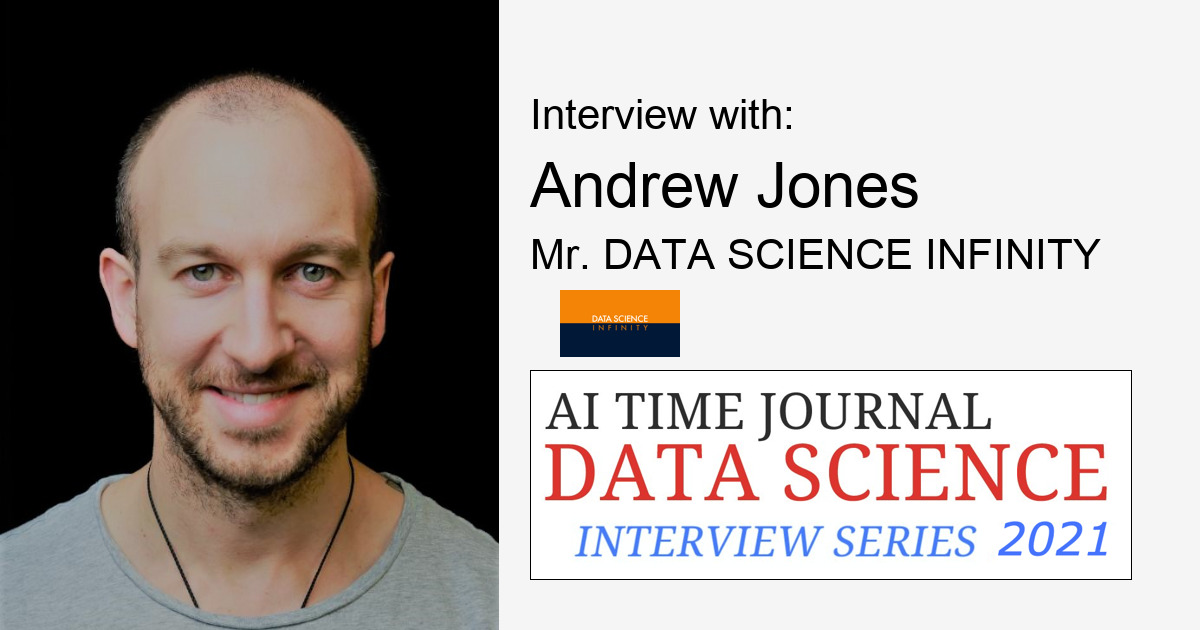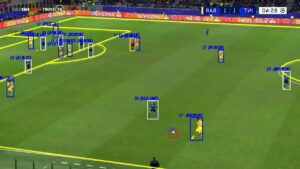
It was an immense pleasure to host a discussion with Andrew Jones from DATA SCIENCE INFINITY as a part of the Data Science Interview Series . The experience that he gained over the years has made his responses profound and explicit. His elucidation on the difference between data science and data engineering with the FIFA football match as an example is commendable.
Also, go through the below-detailed interview to witness how Mr Andrew Jones has explained his career ramp in the technology industry. Give a read to gain an insightful & fun experience.
Data Science: The Journey
Jagan: How did you first get into data science?
Andrew Jones: I’ve been working in the areas of analytics and Data Science for over 13 years – but my journey to where I am now is a little bit of an odd one. I didn’t study Data Science, or Computer Science, or even Mathematics at University. Instead, I did degrees in Marketing & Psychology, and just happened to land my first role as a Marketing Analyst simply through playing cricket with the manager of this team!
In this first role, I started using a programming language called SAS and was blown away by how you could not only manipulate and analyse data but how you could use Machine Learning to predict what customers were going to do!
I was just hooked, and I’ve been so passionate about it ever since that I’ve continued learning and moving into different roles in different industries, and in recent times I’ve been fortunate to have worked for Amazon, as well as Sony PlayStation where I built & prototyped Machine Learning based features for the PlayStation 5, several of which I found out recently have been patented by Sony!
I now run the full online Data Science programme DATA SCIENCE INFINITY where students learn the skills hiring managers actually want, they learn in the right way, and they get unlimited guidance and support along the way. It’s a lot of work, but it’s so much fun. I get to talk Data Science with passionate and amazing students every day – I couldn’t be happier!
Jagan: What are the key skills that you use every day as a data scientist, and how did you develop them?
Andrew Jones: There are of course the technical skills, i.e. the coding and math – but what I find much more interesting, and what I think is often the difference between good Data Scientists and great Data Scientists are softer skills.
If I’m completely honest…the best Data Scientists I’ve worked with aren’t the “smartest” ones by definition.
Sure, they know their stuff in terms of coding, statistics, and other key data concepts – but they’re the ones that can understand what the business is trying to achieve and then use data in clever, and often simple ways to add value.
Communication is key I think – a good Data Scientist knows a lot of technical concepts – a great Data Scientist can simplify these concepts in a way that gets everyone in the business on board.
At the end of the day, as Data Scientists, we’re here to solve problems, not introduce new problems. We’re here to enhance & accelerate business decision making, not get in the way of it – so, don’t always believe the hype that you need to be using the next tool or concept that has been released.
Keep your eye on these new things, of course, absorb them, and by all means, use them where needed. But never, ever forget that we are here to understand the business and the end-user, and to add value wherever we can using data and our very unique set of skills!
Jagan: Books: which books have helped you the most in your journey and why?
Andrew Jones: I think my favourite book in the field is Deep Learning with Python by Francois Chollet. He is the man behind Keras and he is very clever, but he manages to convey everything in a nice order and with true clarity – which is all you can ask for as a reader!
Data Science: The Challenges & The Ability
Jagan: What are the top challenges you currently face as a professional data scientist, and how do you go about tackling them?
Andrew Jones: Trying to figure out where I should focus my time. There is so much to learn, in fact, more than anyone person could learn. Trying to discern between what is important and what can wait can be tricky.
I try to base everything on the value it can add – if I can find a true purpose for applying a concept then that is my number one priority!
Jagan: What is the biggest improvement that you introduced in the last 12 months that has considerably improved your workflow?
Andrew Jones: I can be such a perfectionist – so forcing myself to be ok with “80% good” is hard, but essential. That last 20% can take you to infinity, so get something good, release it, and then refine from there (if needed!). I’m still struggling with this, but it’s important if I ever want to release more content for my online course!
Also, I think the ability to allow myself to rest where possible. I’ve never worked so hard in my life as I have done over the last year with DATA SCIENCE INFINITY. I am my own boss, which is great, but it means I can be hard on myself. Allowing myself a day here and there to do something different is important.
Data Science (:) Infinity
Jagan: Could you explain the Data Science Infinity and the unique features that differentiate it from the other programs?
Andrew Jones: Long story short – DATA SCIENCE INFINITY is set up to be the ultimate way to learn Data Science.
Students learn the right skills (based on input from hundreds of hiring managers, leaders, and recruiters in the field)
They learn in the right way (with a focus on intuition, understanding, and project-based application)
AND you get unlimited support and guidance on your journey.
Students have goals in the field, and I want to be with them on their journey to ensure they get the results they want. I don’t anyone else that is offering that, even at a University/College level.
I released the programme in October of last year, and it’s been a whirlwind experience! The feedback so far has been great, and I’ve had the pleasure of working with some incredible students. My aim for this year is to keep adding more content to ensure that the learning journey continues for those on the programme. It isn’t about completing the course, or any particular destination – it is all about getting results on your learning journey.
If anyone is interested in finding out more then you can visit the DATA SCIENCE INFINITY site here!
Fun With Thought
Jagan: FUN WITH THOUGHT (FWT): Could you explain the difference between Data Science & Data Engineering with a Football FIFA match as an example?
Andrew Jones: Ha, great question!
I guess you could say that Data Science is the process of making data useful or adding value using data – so in football terms, this would be the midfielders – those who are creating plays.
Data Engineering is the process of making data usable, or integrating the data with the infrastructure – so you could equate this to both the defenders and the strikers – those providing the ball (data) up to the midfielders, but those also looking to score the goals (implementation).
The key thing to remember though is that a midfielder (Data Scientist) does not also need to be a complete expert at those other positions (Data Engineering).
Everyone has their job to play in the overall team effort!
Let the midfielders focus on their key tasks – and the defenders and strikers can focus on theirs. We must appreciate the job the other players do and we can even ask how we can better serve them – but let’s not think a midfielder needs to have the skill set of everyone out on the park!

Image Source Link
